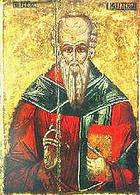
"St. Clement of Alexandria (Titus Flavius Clemens) was the first member of the Church of Alexandria to receive notoriety addition to being one of the foremost masters of the city. Was born in the mid-second century and it is estimated that died between 211 216 Clemente and not born in Egypt as many have believed, but in Athens as he relates the historian Epiphanius Scholasticus (VI century historian) around the year 150 such information seems reinforced by finding that Clemente had an advanced ability to write in Greek classic. According to historians, the parents of Clement of Alexandria were wealthy pagan, high social class. Clemente received a good education as noted by the fact that often refers to Greek poets and philosophers in his works. traveled by Greece , Italy, Palestine and finally Egypt, looking for Christian teachers. finally reached Alexandria, the "city symbol" of this crossroads of different cultures that occurs in Hellenism.
Clemente was a student who recognize Pantænus-in have found their best teachers-, school administrator catechesis of Alexandria. When Pantænus died, his successor was Clement and therefore took over the school. One of the most famous students of which Clement was educated mother. Numerous sources attest that he was ordained presbítero.2 During the persecution of Septimius Severus in 202-203, Clemente leave Alexandria and had to seek refuge in Caesarea by the Bishop Alexander, who was bishop of Cappadocia Flaviada (Alejandro would later become the bishop of Jerusalem). Clemente died shortly before 215 (lived in Cappadocia those last years).
The wide pagan culture Clemente was not removed from her encounter with Christianity. Gentile philosophers, especially Plato, according to him were on the right path to find God; although the full knowledge and therefore of salvation has brought the Logos, Jesus Christ, who calls all to follow him. This is the subject of the first of his writings, the Protrepticus or "exhortation", an invitation to conversion.
Those who decide to follow Christ, Clement devotes the second of his works, the Educator, the 'preceptor'. Comes to educational work and ordinary life situations in Alexandria. This same idea appears in his treatise salvetur Quis dives, "Who is the rich man who saved", a homily that says the Gospel scene of the young man. "




